- Home
- John le Carré
Agent Running in the Field Page 6
Agent Running in the Field Read online
Page 6
‘You a London man then, Nat?’ Ed asks, as we settle to our pints.
I acknowledge that I am indeed such a man.
‘What sort then?’
This is further than people normally go at the Club, but never mind.
‘Just hunting around really,’ I reply. ‘Been earning my bread abroad for a while. Now I’m back home and looking for something to get my teeth into.’ And for good measure: ‘And meanwhile helping an old buddy straighten out his business,’ I add, in a well-tried routine. ‘How about you, Ed? Alice let slip that you were a researcher. Is that about right?’
He ponders my question as if no one’s ever asked it before. He seems mildly irritated to be pegged down.
‘Researcher, yeah. That’s me.’ And after a period of reflection: ‘Research. Stuff comes in. Sort it. Push it out to the punters. Yeah.’
‘So the daily news, basically?’
‘Yeah. Whatever. Home, foreign, fake.’
‘And corporate, presumably?’ I suggest, recalling his invective against his employers.
‘Yeah. Very corporate mindset indeed. Toe the line or you’re fucked.’
I assume he’s said all he wants to say because he has lapsed again into his own thoughts. But he goes on:
‘Still. Got a couple of years in Germany out of it, didn’t I?’ he says, consoling himself. ‘Loved the country, didn’t like the job a lot. So I came home.’
‘To the same sort of job?’
‘Yeah, well, same shit, different branch really. I thought it might get better.’
‘But it hasn’t.’
‘Not really. Still, stick it out, I suppose. Make the best of it. Yeah.’
And that was the net sum of our exchanges about our respective occupations, which was fine by me and I assume fine by both of us, because I don’t remember either of us ever going there again, however dearly my chers collègues wished to believe otherwise. But I do remember as if it were tonight how abruptly our discussion changed course once we had laid the issue of our occupations to rest.
For a while Ed had been scowling into the middle distance and, judging by his rictal grimaces, debating some weighty matter with himself.
‘Mind if I ask you a question, Nat?’ he enquires in a blurt of sudden resolve.
‘Of course I don’t,’ I say hospitably.
‘Only I respect you quite a lot actually. Although it’s short acquaintance. It doesn’t take long to know a person once you’ve played them.’
‘Go on.’
‘Thank you. I will. It is my considered opinion that for Britain and Europe, and for liberal democracy across the entire world as a whole, Britain’s departure from the European Union in the time of Donald Trump, and Britain’s consequent unqualified dependence on the United States in an era when the US is heading straight down the road to institutional racism and neo-fascism, is an unmitigated clusterfuck bar none. And what I’m asking is: do you in broad principle agree with me, or have I offended you and would it be better if I got up and left now? Yes or no?’
Surprised by this unprompted appeal to my political sympathies from a young man I am barely beginning to know, I preserve what Prue calls my decent silence. For a while he stares sightlessly at the people splashing in the pool, then comes back to me.
‘My point being that I would not wish to be sitting here with you under false pretences, given that I have admired your play, and you personally. Brexit is the most important decision facing Britain since 1939, in my opinion. People say 1945 but I’m not at all sure why, frankly. So all I’m asking is, do you agree with me? I know I’m over-earnest. I’ve been told. Plus a lot of people don’t like me because I’m outspoken, which I am.’
‘In the workplace?’ I enquire, still buying time.
‘The workplace is a total washout as regards what I would term free speech. In the workplace it is mandatory to have no strongly held opinion on any subject. Otherwise you’re a leper. It is therefore my policy to keep my mouth firmly shut at all times in the workplace, hence I am regarded as surly. However, I could name to you many other places where people do not like hearing the hard truth, or not from me. Even if such people profess an admiration for Western democracy, they still prefer the easy life as opposed to recognizing their duty as responsible opponents of the encroaching fascist enemy. But I note you have still not answered my question.’
Let me say here and now, precisely as I repeated the same message ad nauseam to my chers collègues, that although the word clusterfuck had not so far entered my vocabulary, Brexit had long been a red rag to me. I am European born and bred, I have French, German, British and Old Russian blood in my veins and am as much at home on the Continent of Europe as I am in Battersea. As to his larger point about the dominance of white supremacists in Trump’s America – well, there too we were not at odds, and neither were many of my chers collègues, however much they might later wish themselves into a more neutral posture.
All the same, I had qualms about giving him the answer he was demanding. First question as always: is he setting me up, is he trying to draw me out or compromise me? To which with absolute confidence I could reply no: not this young man, not in a month of Sundays. So next question: do I ignore Old Fred the Swatownese barman’s hand-scrawled message stuck to the mirror behind the bar: ‘NO BREXIT TALK ALOUD’?
And finally, do I forget that I’m a civil servant, albeit a secret one, pledged to uphold my government’s policy, assuming it has one? Or do I rather say to myself: this is a courageous and sincere young fellow – eccentric, yes, not everyone’s cup of tea and the better for it in my opinion – whose heart is in the right place, is in need of someone to listen to him, is only seven or eight years older than my daughter – whose radical views on any known topic are a fact of family life – and plays a very decent game of badminton?
Then add another ingredient to the mix, one that only now I am willing to admit to, although I believe it was present in me from our first improbable exchange. I am speaking of an awareness on my part that I was in the presence of something rare in the life I had so far led, and particularly in such a young man: namely true conviction, driven not by motives of gain or envy or revenge or self-aggrandizement, but the real thing, take it or leave it.
Fred the barman pours his chilled lagers slowly and with deliberation into crested flutes, and this was the glass Ed brooded over while he prodded at its frosted sides with the tips of his long fingers, head bowed, waiting for my answer.
‘Well, Ed,’ I reply, when I have let enough time pass to indicate due consideration. ‘Let me put it this way. Yes, Brexit is indeed an unmitigated clusterfuck, though I doubt there is much we can do now to put the clock back. Will that do for you?’
It won’t, as both of us knew. My so-called decent quiet is as nothing beside Ed’s prolonged silences that, over time, I came to regard as a natural feature of our conversations.
‘What about President Donald Trump then?’ he demands, enunciating the name as if it were the very devil’s. ‘Do you or do you not regard Trump, which I do, as a threat and incitement to the entire civilized world, plus he is presiding over the systematic no-holds-barred Nazification of the United States?’
I think I must have been smiling by now, but I see no answering light in Ed’s lugubrious face which is turned at an angle to me, as if he needs my answer in sound only, without any moderating facial expression.
‘Well, if in a less fundamental way, yes, I’m with you there too, Ed, if that’s any consolation,’ I concede gently. ‘But he’s not President for ever, is he? And the Constitution is there to inhibit him, not just give him a free rein.’
But this is not enough for him:
‘What about all the tunnel-vision fanatics he’s got round him? The fundamentalist Christians who think Jesus invented greed? They’re not going anywhere, are they?’
‘Ed,’ I say, making a joke of it now. ‘When Trump’s gone, these people will scatter as ash in the wind. Now for God’s sake
let’s have that other pint.’
By now, I really am expecting the broad grin that washes everything away. It doesn’t come. Instead, I get his big bony hand, reached towards me across the table.
‘Then we’re all right, aren’t we?’ he says.
And I shake his hand in return and say, yes we are, and only then does he fetch us another lager.
*
For the next dozen-odd Monday-evening games I made not the smallest effort to deny or water down anything he said to me, which meant that from our second encounter onwards – Match No. 2 in my diary – no post-badminton session at our Stammtisch was complete without Ed launching himself on a political soliloquy concerning some burning matter of the day.
And he got better over time. Forget his raw opening salvo. Ed was not raw. He was just deeply involved. And – easy to say it now – by being so deeply involved, obsessive. He had also, by Match No. 4 at the latest, revealed himself as a well-informed news junkie with every twist and turn on the world political stage – be it Brexit, Trump, Syria or some other long-running disaster – such a matter of personal concern to him that it would have been downright inconsiderate on my part not to allow him his head. The biggest gift you can give the young is time, and it was always in my mind that I hadn’t given Steff enough of it, and perhaps Ed’s parents hadn’t been any too generous in that respect either.
My chers collègues wanted dearly to believe that, by granting him the time of day at all, I led him on. They pointed to our age difference and what they were pleased to call my ‘professional charm’. Sheer drivel. Once Ed had established that in his simple bestiary I was broadly a sympathetic ear, I could have been a stranger sitting next to him on the bus. Even now I don’t recall a single occasion when my own opinions, even at their most sympathetic, made the least impression on him. He was just grateful to have found himself an audience that didn’t do shock, didn’t oppose him or simply walk away from him and talk to someone else, because I’m not sure how long he would have sustained an ideological or political argument without losing his rag. The fact that his opinions on any given topic were predictable before he opened his mouth did not disturb me. All right, he was a single-issue man. I knew the breed. I’d recruited a few. He was geopolitically alert. He was young, highly intelligent within the margins of his fixed opinions, and – though I never had occasion to put it to the test – quick to anger when they were opposed.
What did I personally get out of the relationship, apart from our gritty duels on the badminton court? – another question to which my chers collègues persistently returned. At the time of my inquisition, I had no formed answer at my fingertips. Only in its aftermath did I recall the sense of moral commitment that Ed imparted, how it acted on me like an appeal to my conscience – followed by the broad, slightly hangdog grin that washed it all away. Added together, they gave me a sense of providing some sort of refuge for an imperilled species. And I must have said something of this kind to Prue when I suggested I bring him home for a drink, or invite him to Sunday lunch. But Prue in her wisdom was unpersuaded:
‘It sounds to me as if you’re doing each other a power, darling. Keep him to yourself and don’t let me get in the way.’
So I gladly took her advice, and kept him to myself. Our routine never varied, even at the end. We would play our hearts out on the court, collect our jackets, maybe fling a scarf round our necks and set course for our Stammtisch, loser makes straight for the bar. We’d exchange a few pleasantries – maybe relive a point or two. He’d ask vaguely after my family, I’d ask him whether he’d had a good weekend, and we’d both give bland answers. Then there’d be a kind of expectant silence on his part which I quickly learned not to fill, and he’d launch on his dissertation of the day. And I’d be agreeing with him, part-agreeing with him or at the most saying woah, Ed, steady now, and giving him the older-wiser man’s chuckle. Only rarely, and in the mildest of tones, did I question his more salty assertions – but always with circumspection, because my instinctive knowledge of Ed from the outset was that he was fragile.
Sometimes it was as if someone else was talking out of him. His voice, which was a good one when it was just being itself, would go up an octave, hit a level and stick there on one didactic note, not for long, but long enough for me to think: hullo, I know this register, and Steff’s got one too. It’s the one you can’t argue with because it just rolls on as if you’re not there, so best nod him along and wait till it’s run its course.
The substance? In a sense, each time the mixture as before. Brexit is self-immolation. The British public is being marched over a cliff by a bunch of rich elitist carpetbaggers posing as men of the people. Trump is Antichrist, Putin another. For Trump, the draft-dodging rich boy brought up in a great if flawed democracy, there is no redemption in this world or the next. For Putin, who has never known democracy, there is a shimmer. Thus Ed, whose Nonconformist background has become by stages a notable feature of these outpourings.
Was there progress, Nat? my chers collègues asked me. Did his views advance? Did you have a feeling that he was heading for some sort of absolute resolution? Again I could offer them no comfort. Maybe he grew freer and more outspoken once he felt more confident of his audience: me. Maybe I became a more congenial audience for him with time, though I don’t remember ever being particularly uncongenial.
But I’ll accept that Ed and I had a few sessions at the Stammtisch when I wasn’t worrying overmuch – about Steff, or Prue, or some newly acquired agent who was acting up, or the flu epidemic that took half our handlers off the road for a couple of weeks – and I was giving him near enough my full attention. On such occasions I might feel moved to join issue with one or other of his more radical outpourings, not so much to challenge the argument as to temper the assertiveness with which he delivered it. So in that sense: well, if not progress, a growing familiarity on my side, and on Ed’s a willingness, if only reluctantly, to laugh at himself now and then.
But bear in mind this simple plea, which is one not of self-exculpation but of fact: I didn’t always listen very carefully, and sometimes I switched off altogether. If I was under pressure at the Haven – which happened increasingly to be the case – I would make sure I had my Office mobile in my back pocket before we repaired to the Stammtisch, and I would furtively consult it while he banged on.
And from time to time, when his monologues in all their youthful innocence and assertiveness got under my skin, then rather than head straight home to Prue after our final up-and-down handshake, I would take the longer route home through the park in order to give my thoughts a chance to settle.
*
One last word about what the game of badminton meant to Ed and for that matter means to me. For unbelievers, badminton is a namby-pamby version of squash for overweight men afraid of heart attacks. For true believers there is no other sport. Squash is slash and burn. Badminton is stealth, patience, speed and improbable recovery. It’s lying in wait to unleash your ambush while the shuttle describes its leisurely arc. Unlike squash, badminton knows no social distinctions. It is not public school. It has nothing of the outdoor allure of tennis or five-a-side football. It does not reward a beautiful swing. It offers no forgiveness, spares the knees, is said to be terrible for hips. Yet, as a matter of proven fact, it requires faster reactions than squash. There is little natural conviviality between us players, who tend on the whole to be a lonely lot. To fellow athletes, we’re a bit weird, a bit friendless.
My father played badminton in Singapore when he was stationed there. Singles only. He played it for the army before his decline. He played it with me. In summer holidays on Normandy beaches. In the garden in Neuilly over a washing line for a net, clutching a mahogany tumbler of Scotch in his spare hand. Badminton was the best of him. When I was packed off to Scotland to his godawful school I played badminton there, as he had, and afterwards for my Midlands university. When I was hanging round the Office waiting for my first overseas posting, I rustled up a b
unch of my fellow trainees and under the cover name of the Irregulars we took on all comers.
And Ed? How did he become a convert to the game of games? We’re sitting at the Stammtisch. He is crystal-gazing into his lager, the way he did when he was solving the world’s problems or beating his brains about what was wrong with his backhand, or simply not talking at all but brooding. No question was ever simple once you’d put it to him. Everything needed tracking down to source.
‘There was this gym teacher we had at my Grammar,’ he says at last. Broad grin. ‘Took a couple of us over to her club one evening. That was it really. Her with her short skirt and shiny white thighs. Yeah.’
6
Here, for the edification of my chers collègues, is the sum total of whatever I had happened to pick up of Ed’s life away from the badminton court by the time of the Fall. Now that I come to write it down, the extent of it would surprise me were it not for the fact that I am a listener and a rememberer by training and habit.
He was one of two children born ten years apart into an old Methodist family of North Country miners. His grandfather had come over from Ireland in his twenties. When the mines closed, his dad became a merchant seaman:
Didn’t see a lot of him after that, not really. Came home and got cancer like it was waiting for him – Ed.
His father was also an old-style Communist who had burned his Party card in the wake of the Soviet invasion of Afghanistan in 1979. I suspect Ed nursed him on his deathbed.
After his father’s death the family moved to somewhere near Doncaster. Ed won a place at grammar school, don’t ask me which one. His mother spent whatever free time she had from work at adult education classes until they were cut:
Mum’s got more brain than what she was ever allowed to use, plus she’d got Laura to look after – Ed.
Laura being his younger sister who has learning difficulties and is partially disabled.

 The Honorable Schoolboy
The Honorable Schoolboy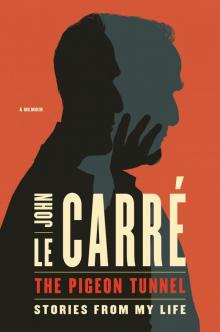 The Pigeon Tunnel: Stories From My Life
The Pigeon Tunnel: Stories From My Life Single & Single
Single & Single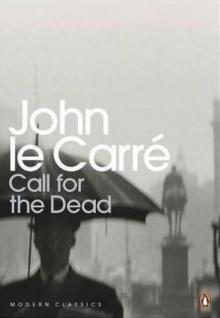 The Spy Who Came in From the Cold
The Spy Who Came in From the Cold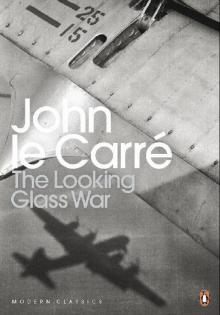 The Looking Glass War
The Looking Glass War The Night Manager
The Night Manager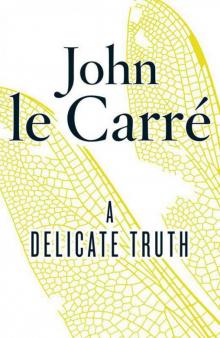 A Delicate Truth
A Delicate Truth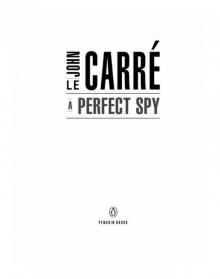 A Perfect Spy
A Perfect Spy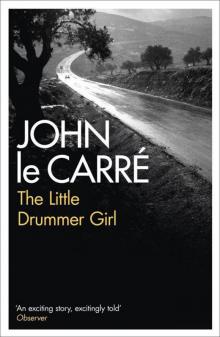 The Little Drummer Girl
The Little Drummer Girl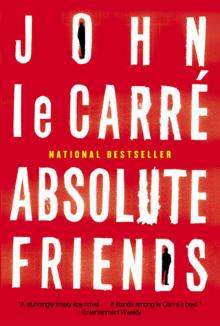 Absolute Friends
Absolute Friends A Murder of Quality AND Call for the Dead
A Murder of Quality AND Call for the Dead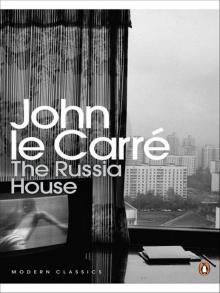 The Russia House
The Russia House The Tailor of Panama
The Tailor of Panama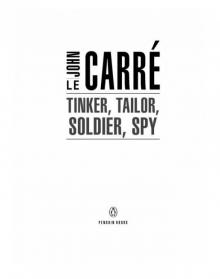 Tinker, Tailor, Soldier, Spy
Tinker, Tailor, Soldier, Spy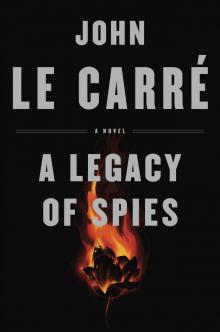 A Legacy of Spies
A Legacy of Spies The Mission Song
The Mission Song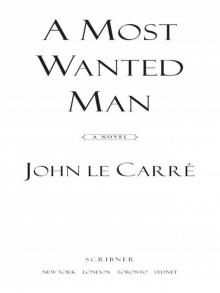 A Most Wanted Man
A Most Wanted Man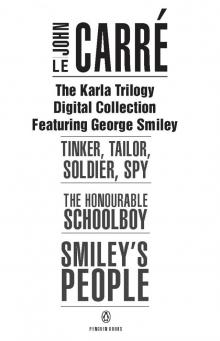 John Le Carré: Three Complete Novels
John Le Carré: Three Complete Novels The Secret Pilgrim
The Secret Pilgrim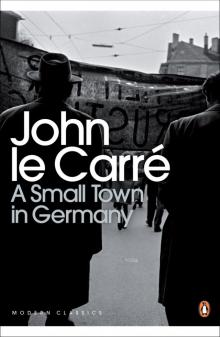 A Small Town in Germany
A Small Town in Germany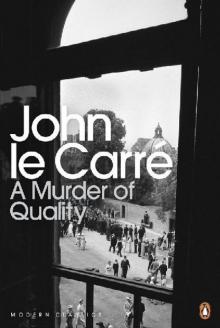 A Murder of Quality
A Murder of Quality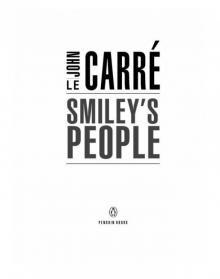 Smiley's People
Smiley's People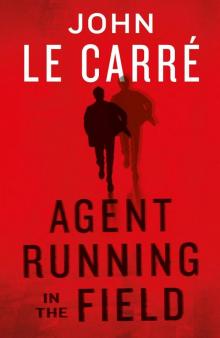 Agent Running in the Field
Agent Running in the Field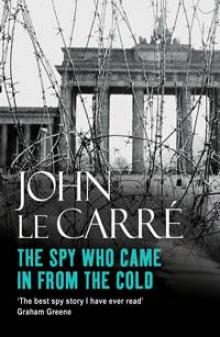 The Spy Who Came in from the Cold s-3
The Spy Who Came in from the Cold s-3 The Pigeon Tunnel
The Pigeon Tunnel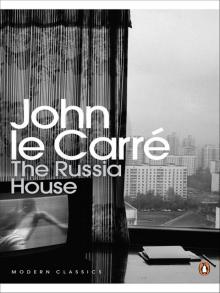 The Russia House - 13
The Russia House - 13 The Honourable Schoolboy
The Honourable Schoolboy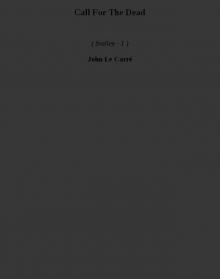 Call For The Dead s-1
Call For The Dead s-1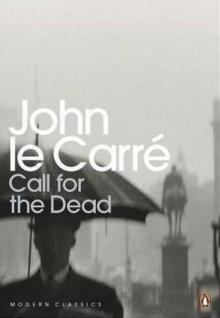 Call for the Dead
Call for the Dead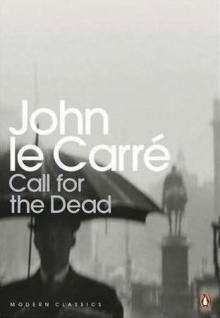 Call for the Dead - 1
Call for the Dead - 1